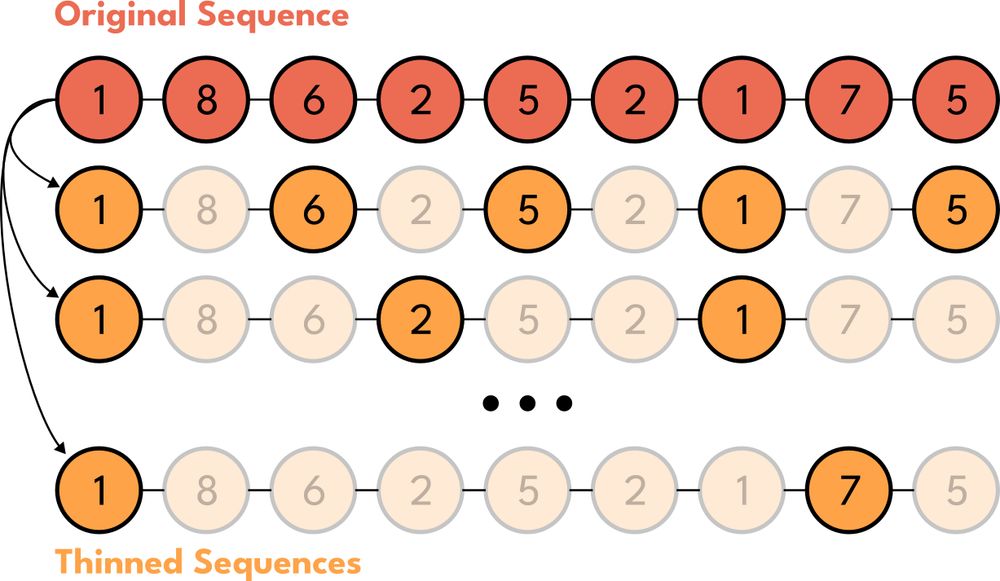PhD Fellowship in Psychology - Dr Matthew Mak
Recruiting a #PhD student interested in cognitive psychology (language, memory) and AI. Come join me at
@warwickpsych.bsky.social. Overseas students are welcome.
Feel free to reach out to me to enquire. #PhD #Fellowship #academia #apply. Deadline in mid-March
warwick.ac.uk/fac/sci/psyc...
29.01.2026 11:31 — 👍 7 🔁 7 💬 0 📌 0

Photo of Dr Lucas Castillo
Welcome back to Dr Lucas Castillo, who is starting an ESRC-funded postdoc with Prof. Adam Sanborn using statistical sampling algorithms as standard models of human perceptual and cognitive behaviour. Lucas recently gained his PhD in the department exploring why people are not able to act randomly.
07.01.2026 13:28 — 👍 11 🔁 3 💬 0 📌 0

It travels through time... differently
07.09.2025 16:30 — 👍 1 🔁 0 💬 1 📌 0
Thank you! And thanks @pleonv.bsky.social, Nick Chater, and @asanborn.bsky.social who were an essential part of this paper
24.05.2025 08:24 — 👍 8 🔁 1 💬 0 📌 0
OSF
🚀🚀 Very excited about this new preprint with @yunxiao-li.bsky.social and @asanborn.bsky.social!
Months ago we released the samplr package on CRAN (helps you use sampling algorithms + cogn. models for human data). Here we explain the theoretical background and show how to use the pkg
osf.io/ax8hm
21.05.2025 09:45 — 👍 13 🔁 4 💬 1 📌 1
Our lab has a list of papers that use statistical sampling algorithms like MCMC to explain human behaviour. Thanks to @lcastillo.bsky.social, you can select by behaviour or algorithm.
If we've missed any, please let us know!
sampling.warwick.ac....
16.05.2025 11:19 — 👍 12 🔁 6 💬 0 📌 0
YouTube video by Michael Spicer
Tory MP IT Support
Tory MP IT Support
26.04.2025 10:26 — 👍 698 🔁 250 💬 43 📌 44
Thrilled to share my first post here with something I’m truly proud of; My PhD paper is finally out in @commspsychol.bsky.social. Thanks to amazing @ktsetsos.bsky.social for his wise insights and our reviewers for their constructive comments.
You can read the full paper here: rdcu.be/eguDX
1/10
14.04.2025 11:53 — 👍 15 🔁 4 💬 1 📌 2
The Hungry Lens: Hunger Shifts Attention and Attribute Weighting in Dietary Choice
🚀 Revised Reviewed Preprint out in eLife 🚀
Excited to announce that my paper on the cognitive mechanisms underlying hunger-driven dietary choice is now available on @elife.bsky.social
elifesciences.org/reviewed-pre...
25.03.2025 12:56 — 👍 8 🔁 4 💬 1 📌 2
APA PsycNet
🚀 New paper out in Psychological Review!
How does learning change across the lifespan? We propose that resource rationality—adapting belief updating to cognitive limitations—can explain age-related differences in learning.
📖 doi.org/10.1037/rev0...
👇 A short thread:
28.02.2025 05:37 — 👍 31 🔁 11 💬 3 📌 1
OSF
🚨 A new preprint is out!
How does utility influence mental simulations of risky events? 🤔🎲
We tested this across 4 experiments & found that most people simulate probabilities accurately, but biases emerge in key conditions!
If you want to learn more, keep reading!
doi.org/10.31234/osf...
20.02.2025 18:42 — 👍 6 🔁 5 💬 1 📌 0
with @pleonv.bsky.social, Johanna Falbén, Nick Chater and @asanborn.bsky.social. Thank you!
(8/8)
20.02.2025 11:14 — 👍 0 🔁 0 💬 0 📌 0
If you use randomness in cognitive models: if you were using it as a catch-all for unexplained variance then keep at it, but if your model postulates that people use random draws then consider the time frame used and if lower than 2s consider autocorrelated noise instead. (7/8)
20.02.2025 11:14 — 👍 0 🔁 0 💬 1 📌 0
If you like to be creative, explore the world, make good choices, be protected from agents exploiting patterns in your behavior: this is good news! We now know that the strategy of behaving randomly is available to humans and doesn't need much time, which is useful in all these domains.
(6/8)
20.02.2025 11:14 — 👍 1 🔁 0 💬 1 📌 0
We found people's sequences are random if 2-4s elapse between items! 🤯🤯
In the experiment we ran we asked people to do the task at two different speeds and so we could test whether it's time that matters (as in the weather) or number of items (as in card shuffles). The answer: time ⌛⌛⌛(5/8)
20.02.2025 11:14 — 👍 0 🔁 0 💬 1 📌 0

Schematic representing the process of thinning sequences: on top, the original sequence reads 1, 8, 6, 2, 5, etc. Below, a thinned sequence reads 1, 6, 5 (every second item). Sequences below show thinning every third item and every seventh item.
We analysed previous data from experiments asking people to generate sequences at random, and did our own experiment: we looked at altered versions of the sequences where we skipped some items (thinned sequences). This way we could evaluate sequences at different delays between items. (4/8)
20.02.2025 11:14 — 👍 0 🔁 0 💬 1 📌 0
We thought: actual random stuff isn't random instantaneously (the weather is unpredictable some time from now; a deck of cards needs a few shuffles). Maybe we haven't given people enough time? (3/8)
20.02.2025 11:14 — 👍 0 🔁 0 💬 1 📌 0
Being able to generate randomness would be quite useful (to avoid others taking advantage of patterns in your behavior, to be creative, to explore your environment...) -- BUT! Research on human random generation says people cannot do this (2/8)
20.02.2025 11:14 — 👍 1 🔁 0 💬 1 📌 0
OSF
New Preprint Out! 🚀🚀
Can people generate a random sequence if given enough time?
Keep reading if
- You make cognitive models with randomness in them
- You like to explore the world, be creative, choose well
- You want protection from clever agents exploiting patterns in your behavior.
osf.io/awg9j
20.02.2025 11:14 — 👍 8 🔁 4 💬 1 📌 0

Michaela Pawley is awarded a UK Data Impact Fellowship 2025-26. Congratulations!
🎉 Congratulations to @michaelapawley.bsky.social, a PhD student of the Warwick Sleep and Pain Lab @nkytang.bsky.social, on being awarded a UK Data Impact Fellowship from the @ukdataservice.bsky.social! This competitive programme supports 5 early career researchers using UK Data Service resources.
18.02.2025 09:45 — 👍 11 🔁 5 💬 1 📌 2
OSF
In our new preprint, my co-authors and I explore how people’s probability judgments sometimes don’t add up the way they should, and how these violations can help us compare different models of how people make these judgments!
osf.io/preprints/ps...
06.02.2025 15:20 — 👍 7 🔁 4 💬 0 📌 0
Automatically tweets new posts from http://statmodeling.stat.columbia.edu
Please respond in the comment section of the blog.
Old posts spool at https://twitter.com/StatRetro
Postdoc at Warwick Uni. Keen primate. Interested in growing things and occasionally playing instruments. Borderline utility cyclist
Normalien | Cognitive Science MSc (Data Science & Modeling) from l'École Normale supérieure
Born and raised in Japan. Lived in the US, and the Netherlands. Now, I am teaching psychology in a British university. https://warwick.ac.uk/fac/sci/psych/people/skita/skita
Part of Warwick University's Psychology Department, the Warwick Lifecourse and Neonatal Group brings together researcher working in the following projects https://warwick.ac.uk/fac/sci/psych/research/lifespan/preterm-lifecour
Associate Professor, Department of Psychology, University of Warwick.
Interested in vision, semantics, memory, brain imaging and XR
She/Her
Associate Professor at Warwick. Interested in developmental psycholinguistics, neuroscience, research methods, bee-keeping, Gaeilge, vintage clothing, dressmaking. Pinko lefty woke type but not that fond of tofu.
Personality and cross-cultural psychologist
Professor at Warwick, Tallinn, and Tartu
Balances life between 🇬🇧 and 🇪🇪, enjoying the best of both worlds—most of the time
https://warwick.ac.uk/fac/sci/psych/people/arealo/area
Professor of Psychology in the Department of Psychology at Warwick, specialising in the study of disaster response (including pandemic threat), culture and interpersonal relation
Reader in Psychology at the University of Warwick (@warwickpsych.bsky.social)
Sensorimotor control researcher at the University of Warwick. Loves art, food, and sci-fi.
Assistant Professor in Psychology, University of Warwick
Interests: long-term consequences of preterm birth, life-course transitions and women's health
Social psychologist | Academic | LGBTQ+ Research | EDI Advocate | Views my own | he/him
Neuro prof at Princeton, social media cynic.





